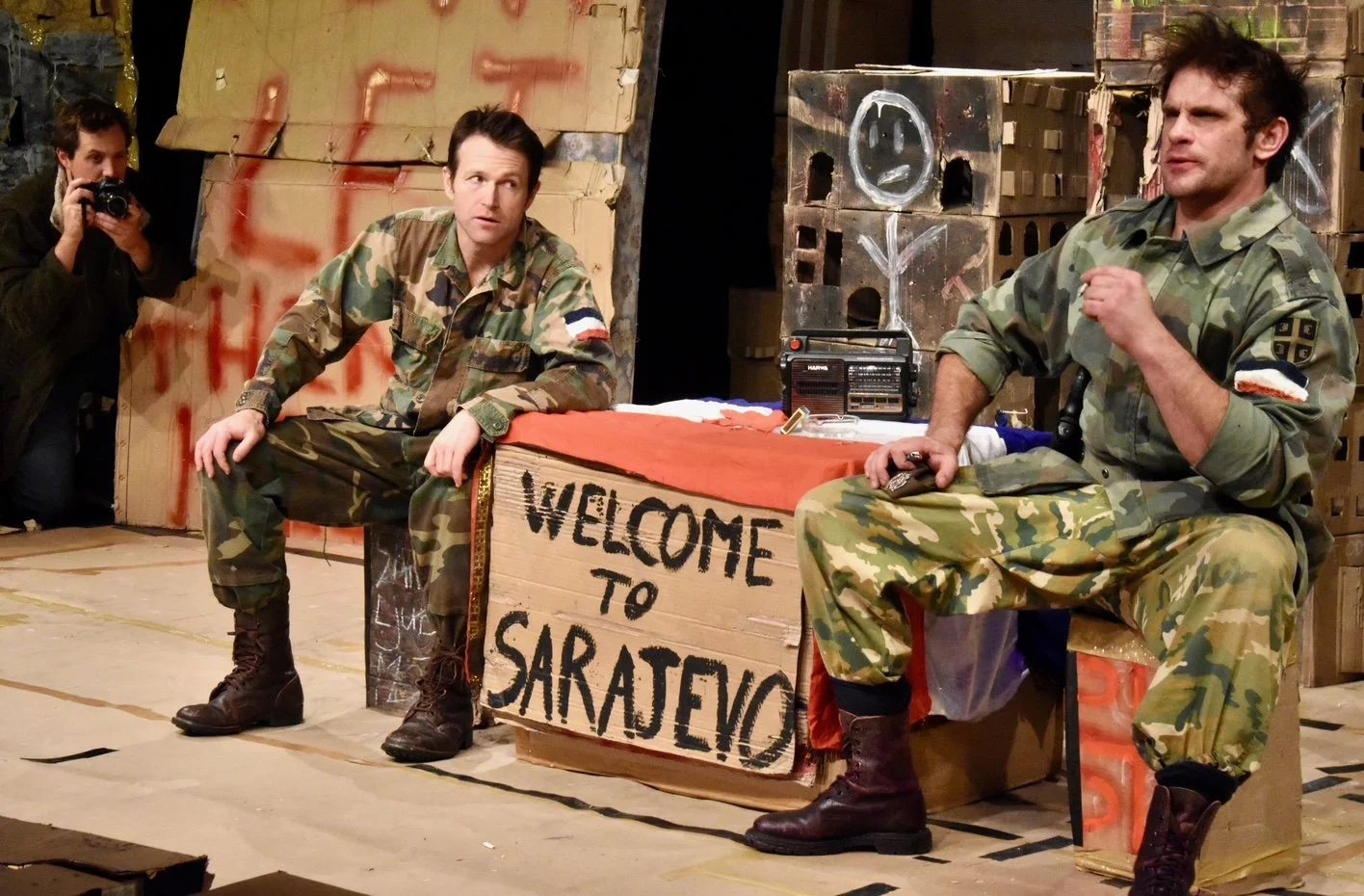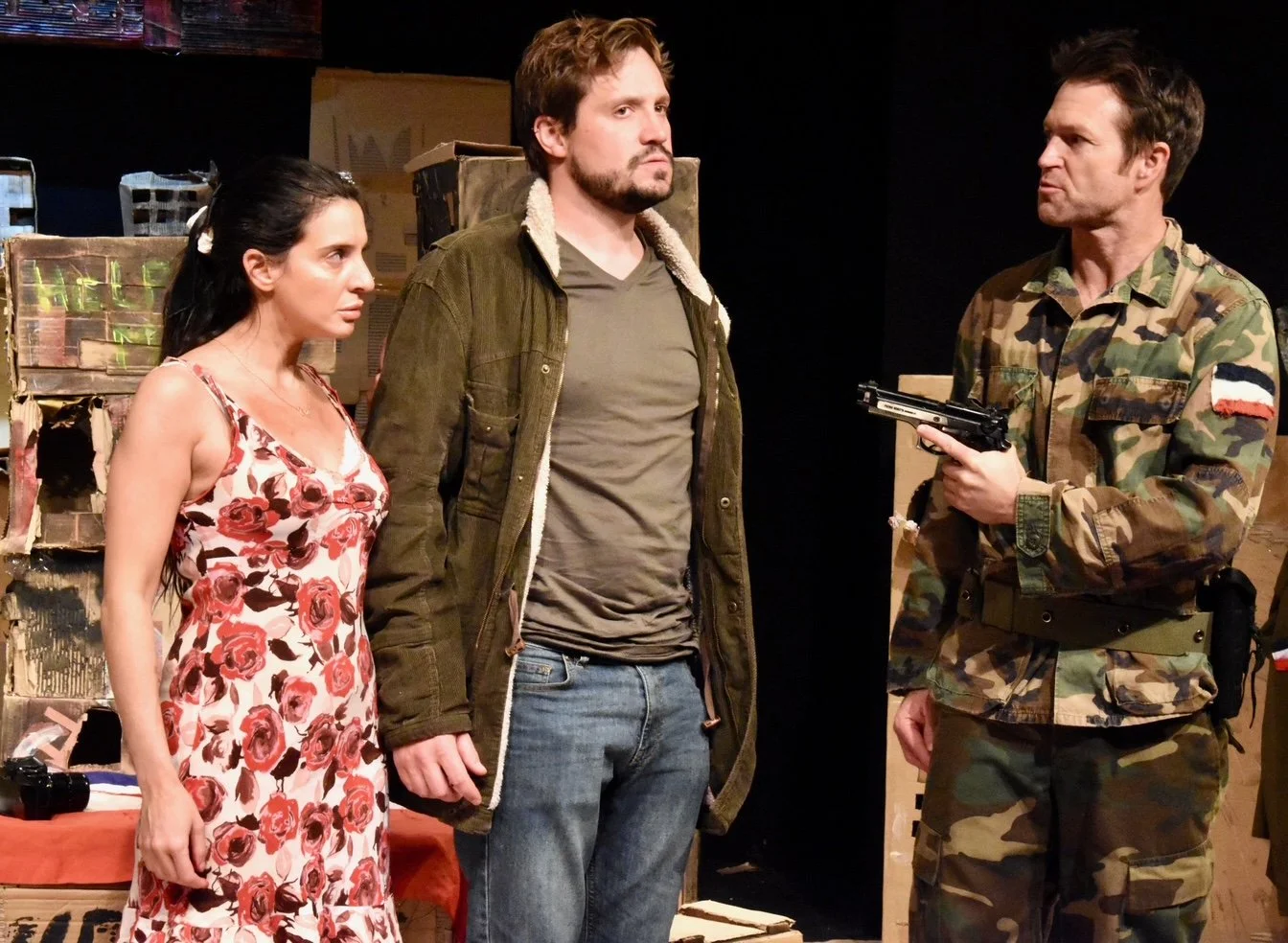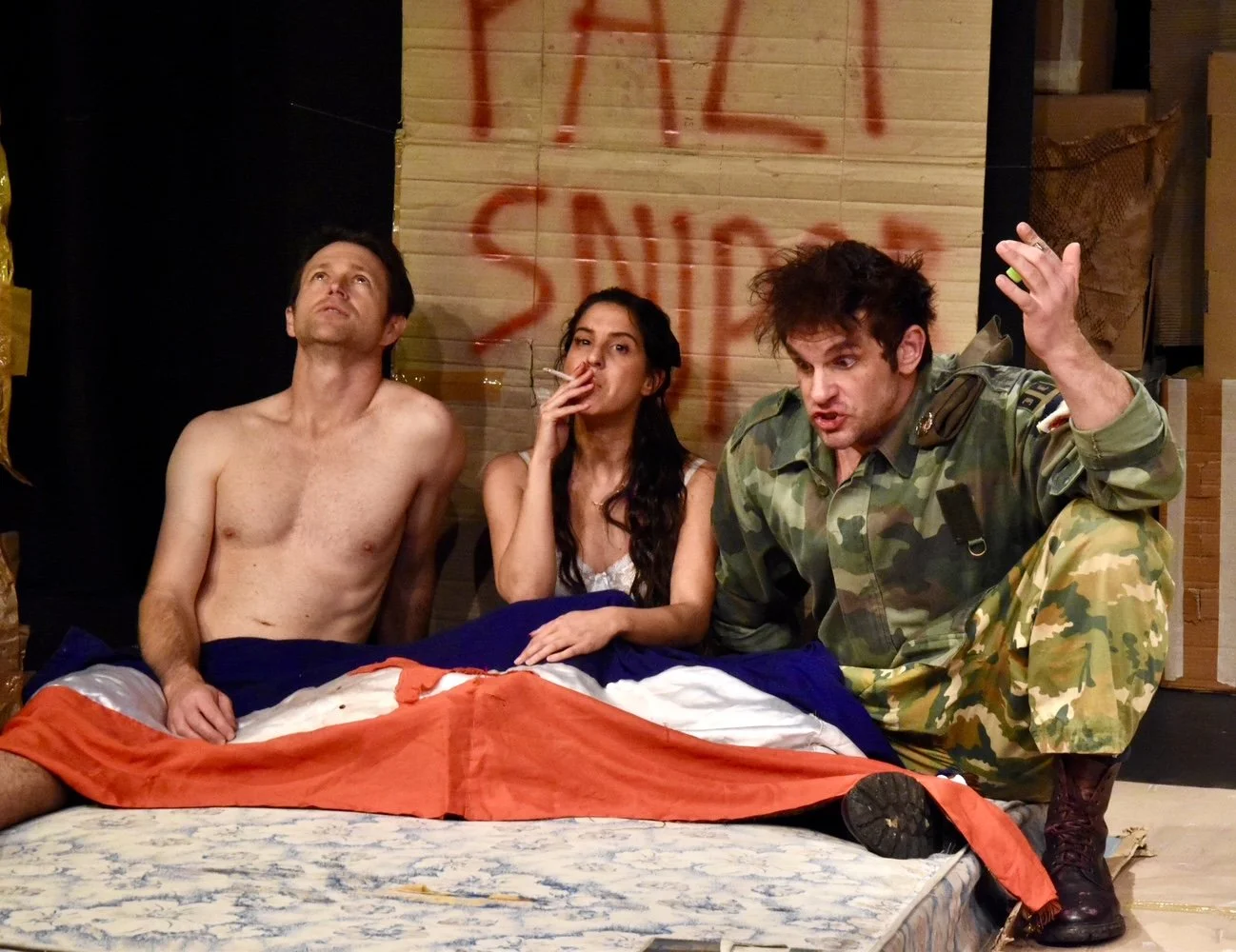When Friendship Becomes a Casualty of War: A Review of Sarajevo
There's a moment in Sarajevo when the stage falls into near-complete darkness, illuminated only by the trembling glow of torches held by characters whose faces have become masks of grief and rage. In that moment, sitting in the intimate space of that theatre, I realized I had stopped breathing. This is what urgent theatre does. It doesn't let you look away, it doesn't offer comfort, and it refuses to pretend that the horrors of war happen only to other people, in other times.
Aimèe Mica Komorowsky's Sarajevo, directed by Thorsten Wedekind, is not theatre for those seeking easy entertainment. It is a confrontation with the darkest capabilities of human nature, wrapped in the devastating story of three childhood friends (Mirela, Aleksander, and Slobo) whose bonds are systematically destroyed by the Bosnian War. What makes this production particularly haunting is not just its depiction of war's brutality, but its unflinching examination of how ideology transforms ordinary people into perpetrators, victims, and witnesses, often all at once.
A Home Becomes a Battleground
The play's genius lies in its structure. Rather than presenting war as a distant historical event, Komorowsky places us inside a single home that becomes both sanctuary and prison. This domestic space, rendered stark and claustrophobic on stage, serves as an oasis amid chaos, a place where these young people can momentarily process the unraveling of their world before being thrust back into the machinery of ethnic violence. The constant backdrop of distant gunfire, explosions, and the ambient terror of a city under siege creates an atmosphere of relentless tension. We never see the war directly, yet we feel it in every moment, pressing against the walls, seeping through the floorboards, infecting every conversation and relationship.
The introduction of Peter, a South African photojournalist played with raw vulnerability by Jeremy Richard, adds a crucial layer of moral complexity. Peter arrives with his camera, his idealism, and his foreign privilege, desperate to document truth, to make his name, to matter. But the play asks uncomfortable questions about the ethics of witnessing. What does it mean to photograph suffering? Who benefits from these images of atrocity? Is there any meaningful difference between the voyeur and the journalist? Richard's performance captures the slow erosion of Peter's certainty, his dawning realization that he is not separate from the story he's trying to tell, that his very presence changes the dynamics of survival and choice.
What struck me most forcefully about Sarajevo is how it refuses to simplify the human dimensions of war. In every depiction of conflict I've encountered across literature, film, and theatre, the overarching truth remains the same: individual people, often young and brimming with potential, are sacrificed for vague, flawed ideals of justice. The tribal nature of war transforms ordinary people into monsters and this play tackles that transformation with devastating precision. The writing is sharp and poignant, showing us how propaganda, fear, and the desperate need to survive can obliterate even the deepest bonds of friendship and love.
Performances That Refuse to Simplify
Ivan Nedeljkovic deserves particular recognition for his portrayal of Slobo. Actors of his physical presence are too often relegated to one-dimensional roles of brute force, but Nedeljkovic brings remarkable nuance to this complex character. We see the raw masculinity, yes, but we also witness the psychological unraveling, the way war strips away layers of humanity until something unrecognizable remains. His performance is both terrifying and heartbreaking, a reminder that perpetrators are also made, not born. Alistair Moulton Black and Aimèe Mica Komorowsky complete this ensemble with equally committed performances, creating characters whose deteriorating relationships feel painfully authentic. Each actor brings depth to roles that could easily have become archetypes, instead presenting us with fully realized human beings whose choices, however terrible, remain tragically comprehensible.
The technical elements of the production enhance rather than distract from the storytelling. The use of torchlight, in particular, creates an atmosphere that traditional stage lighting could never achieve: intimate, primitive, unstable. It reminds us that in war, even light becomes unreliable, that darkness is both literal and metaphorical. There were moments when the Balkan accents slipped slightly, briefly disrupting the immersion, but these were minor flaws in an otherwise exceptional production.
Why This Story Matters Now
What makes Sarajevo feel urgently relevant is not just its historical specificity but its universal resonance. We live in a time of ongoing conflicts around the world, wars that flood our social media feeds, that we scroll past between dinner plans and work emails. This play forces us to reckon with what those distant headlines mean for actual human beings. It reminds us that behind every statistic are friendships destroyed, families torn apart, and individuals forced to make impossible choices. The Bosnian War resulted in approximately 100,000 deaths and displaced over two million people. But Sarajevo doesn't deal in statistics. It gives us four people in a room, and that specificity makes the tragedy feel real in a way numbers never can.
The play's international recognition speaks to its power as more than entertainment. This is theatre as testimony, as warning, as an act of remembrance. In a world increasingly comfortable with forgetting, with dismissing history as irrelevant to our present concerns, Sarajevo insists that we remember. Not because the past is dead, but because it isn't. The ethnic divisions that tore apart Yugoslavia persist in Bosnia today. Nationalism, tribalism, and the weaponization of identity continue to fracture societies around the world.
War, friendship, and love are perhaps the most powerful forces of the human condition, and it would be easy for a play tackling all three to feel over-dramatic or emotionally manipulative. But Sarajevo walks that tightrope with precision and grace. I believed completely in the situation these characters faced. I mourned for what they lost. And I left the theatre shaken by the recognition that the distance between their world and mine is far smaller than I'd like to believe.
This is brave, necessary theatre. It asks difficult questions without offering easy answers. It demands that we confront our own capacity for both cruelty and courage. There is nowhere to hide from the intensity of these performances and that creates a shared space for genuine reckoning.
Sarajevo reminds us that those caught in conflict are rarely the ones who cause it, but they are always the ones who pay the price. In our current global context, with violence erupting across multiple continents, this message has never felt more essential. We owe it to ourselves, and to those still living through war's horrors, to bear witness, not from a comfortable distance, but up close, where we can see the faces, hear the voices, and recognize our shared humanity before it's too late.
Sarajevo is on at Theatre on the Square until 18 October 2025. Get your tickets here.


